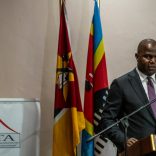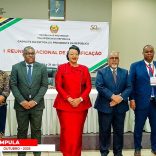BP confirms oil and gas find in Namibia’s Orange basin
Mozambique: Central Bank shifts stance and acknowledges partial blame for SIMO network failures

File photo: O Pais
The Governor of the Bank of Mozambique, Rogério Zandamela, has stated that the payment system is now stable, following several months marked by failures in the network managed by the Mozambique Interbank Society (SIMO), which adversely affected individuals and businesses both domestically and internationally.
Regarding culpability, Zandamela no longer solely points fingers at “commercial banks that delayed migrating to the new system,” acknowledging that the Central Bank is also responsible. “We experienced unavailability in some credit institutions. However, the good news today is that the system is stabilized. Transactions are flowing normally. A comparative analysis, considering that transaction peaks occur at month-end, clearly shows that, compared to April, transactions in May are flowing smoothly, without problems or disruptions, which is what we want: an efficient, secure, and convenient system for users,” stated Zandamela.
During a press conference held on Monday in Maputo, the Governor admitted that in the face of failures leading to losses, it was legitimate to ask who is responsible. Apart from pointing fingers at some systemically important banks, he recognized that the Bank of Mozambique, along with banks and many other operators, is making efforts to find a definitive solution.
“We acknowledge that there is a problem. When this is the case, it does not matter to us to find out who is responsible, whether it is bank ‘S’ or bank ‘A.’ Our concern, all of us, in collaboration with the banking sector, is that the system needs to be up and running. No one benefits when the system is unavailable. However, there is work in progress, involving everyone – SIMO, banks, all users, and the Bank of Mozambique – to identify and understand what may have caused the problem,” said Zandamela.
Responding to questions from journalists, the Central Bank Governor said that the failures occurred in specific institutions, but due to their size, there was a feeling that “everything was paralyzed, that there was a blackout, but that was not the case. What happened cannot be compared to the situation we faced in 2018, where the blackout was total because someone decided outside the country.”
Regarding why the Bank of Mozambique did not communicate, Zandamela said it was also a pertinent question. However, he mentioned difficulties because it was a crisis management situation specific to a particular institution, and in that case, “the Bank, as a regulator, cannot come forward and say that the problem we are facing is with that institution not doing ‘A,’ ‘B,’ and ‘C.’
If it were so, we would be reacting irresponsibly because we could precipitate the problem onto that institution with incalculable consequences, and ultimately, it could lead to the collapse of that institution. In this context, it is up to the specific institution to provide this information to its affected clients, about the existence of a problem and efforts to resolve it,” added the Central Bank Governor.
However, in times of crisis, Zandamela appealed to the media not to disseminate false information based on rumors that could precipitate the collapse of the system. “Each of us, particularly the media, has the responsibility to disseminate information that does not precipitate the collapse of institutions that are doing everything to recover and restore the system as quickly as possible,” said the manager.
Aware that it is part of the problem, the Central Bank says it also needs to communicate, just like SIMO and the banks, as well as telecommunications operators, whose problems also affect the system.












Leave a Reply
Be the First to Comment!
You must be logged in to post a comment.
You must be logged in to post a comment.